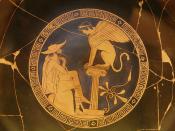The concept of sight is one of the major motifs throughout Sophocles' play Oedipus the King. The play revolves primarily around series of events caused by many people's insight or lack there of. Oedipus does not see that he is caught up in a web of cruel destiny that he cannot escape. Tiresias, one of Apollo's prophets who happened to be blind, was the one who was sent to tell Oedipus his fate. Throughout the play, Oedipus retaliated to the prophecy by telling Tiresias that he couldn't know his fate because he was blind. Also, many scholars joke in the fact that another meaning for the name Oedipus, Oidas, sounded like the Greek word meaning "I know". Oedipus was "blind" in the sense that throughout the play, he was the one person who knew the least about his own life. In the end, when Oedipus is finally able to "see" the truth, he is in fact blind.
Oedipus asks Creon to bury his wife, Jocasta, and to care for his children, and in that instant he takes on the role of King again. Creon disagrees and states that they need to see what Apollo and the other Gods want them to do. By "choosing" blindness over death, Oedipus once again proves that the Gods are in control of everyone's lives; he acts out the last of the prophecy. Through the entirety of the play, Oedipus was pushing the fact that humans were in control of their lives, that his fate hadn't come true; therefore the Gods weren't in control. But in the end, when Oedipus finally realizes that he had acted out the complete prophecy, was blind yet could see clearer than ever, he had realized that when trying to fight free will and fate, that the Gods and...


